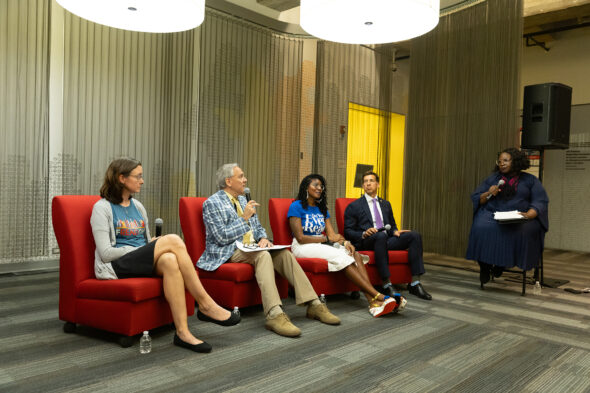Banned Book Readout draws support from elected officials, activists, community

llinois Secretary of State and State Librarian Alexi Giannoulias and the UIC University Library hosted a Banned Book Readout at the Richard J. Daley Library IDEA Commons Oct. 4 to commemorate Banned Books Week, spread awareness about the topic and to discuss ways that libraries and communities can address the growing problem that undermines intellectual freedom.
Banned Books Week is an annual event celebrating the freedom to read and highlights the value of free and open access to information, bringing together the entire book community — librarians, booksellers, publishers, journalists, teachers and readers of all types — in shared support of the freedom to seek and express ideas.
UIC Dean of Libraries Rhea Ballard-Thrower opened the event with a plea to attendees to listen and learn from the event and to get involved in the fight to end book bans.
“Go to those school board hearings, go to your public library and support your libraries,” Ballard-Thrower said. “This is an opportunity in which you can make a difference. Even if it’s just an email expressing that you do not feel that this is a time when we should be banning books at all…if all of us did those small things together, it’s amazing what impact you would have to actually stop this very, very scary situation that we are engaged in right now.”
Michael Fernandes, vice president of UIC Undergraduate Student Government, introduced Giannoulias, highlighting his record of supporting librarians and fighting to secure funding for ebooks and technology for libraries. Giannoulias shared his appreciation for UIC’s contribution to the city of Chicago and spoke about the negative impact of book banning on democracy. Soon after assuming the role of State Librarian in January 2023, Giannoulias introduced anti-book banning legislation (which became law in June 2023 and goes into effect in January 2024) as a measure to protect First Amendment rights and prevent book banning.
In a press release issued by his office, Giannoulias said, “As State Librarian, I am committed to protecting our libraries and librarians no matter what, especially at a time when there is such a surge of vitriol aimed at them nationwide. My hope is that Illinois can be a safe haven for librarians and a beacon for other states that are looking to protect the Freedom of Speech. There is no place for book bans or censorship in our state or country.”
Bestselling author Nic Stone read a passage from her young adult novel “Dear Martin,” one of the most frequently challenged or banned books in the United States. Stone wrote following the birth of her son and the shootings of Jordan Davis in Jacksonville, Florida, and Michael Brown in Ferguson, Missouri. “Dear Martin” examines race relations in America through the eyes of a Black teenager who has been racially profiled and searches for guidance by writing letters in his journal to Martin Luther King Jr.
During the panel discussion, moderated by Tracie Hall, executive director of the American Library Association, Stone spoke about how disheartened she felt encountering so few Black characters in the canonical works she read while growing up. She continues to write for Black youth audiences to ensure that they see themselves reflected in literature. Book bans disproportionately limit access to impactful work written by and for underrepresented people as these communities are the most frequently targeted by bans.
“Most of the books that are being challenged are being challenged because they are talking about the lived experiences… a lot of memoirs and histories of people who are already marginalized, mostly people of color and mostly LGBTQIA authors,” Hall said.
Two panelists from the UIC College of Education Edward Podsiadlik, clinical associate professor, and Gina Caneva, a doctoral student, joined Giannoulias and Stone. Panelists shared their personal stories and perspectives on book banning and its impact on education, and what we can do together to stop book censorship in libraries and schools.
“Book banning is a public form of bullying, and we need to stand up to bullies,” Podsiadlik said. “When I hear about banning a book… I believe it’s banning people’s voices. It’s banning people’s existence, banning their identity. And what could be more important to raising children than nurturing and validating their identities and their aspirations and their very beings? So yes, that is what’s at stake. We need to honor and validate each other, and we don’t do that by banning each other.”
Other local elected officials at the Banned Book Readout offered their support to end book bans, including State Sen. Lakeshia Collins, State Rep. Yolanda Morris and State Rep. Kelly Cassidy. UIC community members and anti-book banning activists contributed to an engaging Q&A session following the panel discussion. A group of students from Lindblom Math and Science Academy visiting UIC for tours and a library research workshop also attended the event.
– Written by Andrea Smith
